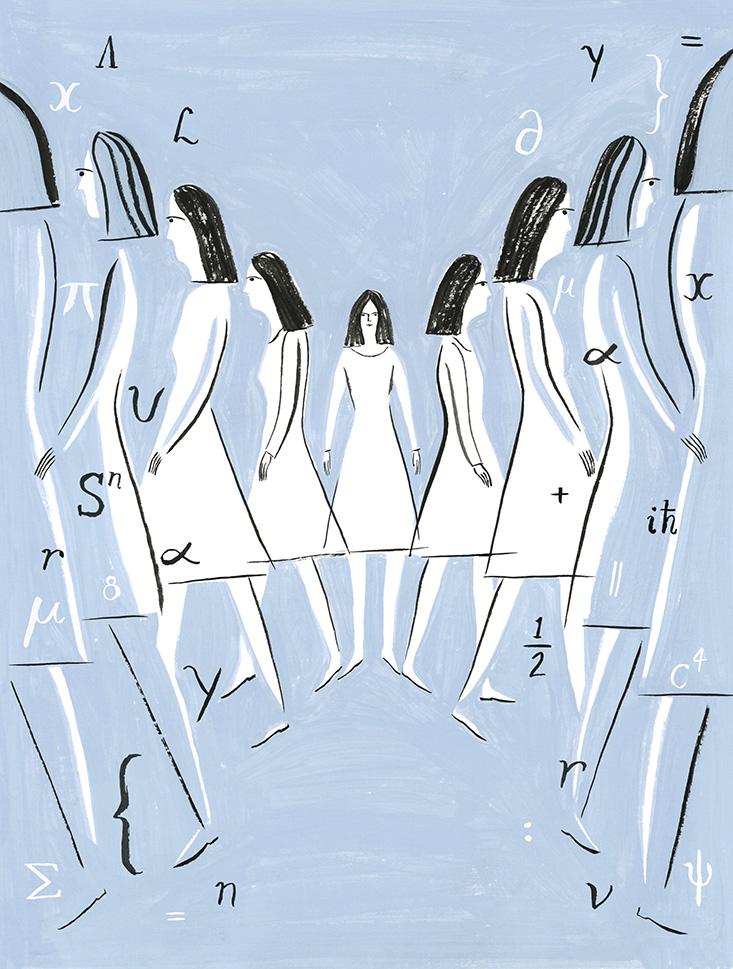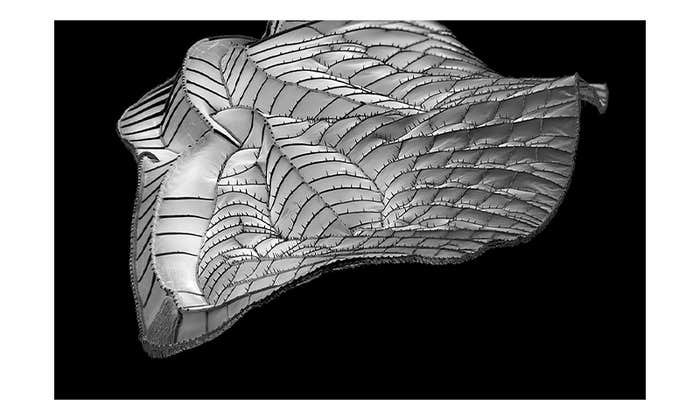I spent years in graduate school where terrified students would desperately try to make small talk with Stephen Hawking in the corridors. There were few other women and no one else who was not brilliant, or at least capable of convincingly acting the part. When we walk by one professor he averts his eyes and, facing the wall, mutters fervently and kneads his sweaty palms. We assume he is religious. As it turns out, he is simply frightened of women.
It is fortunate for him that there are so few of us. Another professor is reluctant to advise girls who will only get married and leave the field. Another refers to all women as Anna, what, in physics, we call a simplifying assumption. It doesn’t matter anyway.
The women speak to the department chairman, a litany of small complaints: An elderly Fellow tried to kiss me. Someone grabbed me, I don’t know who, they all laughed about it. Do we belong here? He sits back and shakes his head and says, helplessly, what do you want me to do?
In another universe we are terrifying and brazen, Amazons with steel breastplates. In this one, though, we are scared and tired and wary of wandering hands. The other girls are brilliant: They are required to be. I am stupid and 22 and in love with the famous young professor. He loves me too, until he doesn’t.
The equations I study are like old friends to me; you can think of them as illustrations, maybe, or small, restful breaks between recognizable words. Here is one:

This is fairness in geometric form, the shape formed when everything is the same distance from the center. Mathematics liberates us from physical space. Increase n to add dimensions: point, line, circle, sphere. Go further: Embed curved hyperspheres in higher dimensional space. We can simplify complicated things, then complicate them further.
But sometimes things are simple. Look closely enough at a curved surface and it appears flat. You move
in straight lines down simple paths. Our everyday experiences are described by simple, familiar laws: inertia, force, reaction, f = ma.
So I show up every day, unwanted but noticed. There are simple narratives for girls like me: tried, used, found wanting. I feel like a white rabbit after the snow retreats in early spring. There is a gentlemen’s agreement between us: Leave, and we will let you go. I graduate, barely, and go back to California. The sun shines, I am happy, and the universe goes on without me. Examined closely enough, everything is mundane.
Nature abhors a vacuum; physicists love one. We have rich vocabularies to describe different flavors of emptiness. There are false vacuums, classically stable but subject to the strangeness of quantum mechanics. These are universes ever prone to decay. The rot proceeds by bubble: True vacuum nucleates inside the false one, making a sphere of baby universe. Inside the bubble the constants of nature take new values. The laws are the same inside and out, but followed differently. We create worlds inside worlds, let others fall away.
Here is a fundamental law: We cannot go backward in time. And why would I? Sixteen, too skinny, angry at the world, and hoping not to be called to the board to solve equations. Refusing to learn times tables to 12. Dreams that do not require competence in basic algebra.
He sits back and says, helplessly, “What do you want me to do?”
But the world is not lacking in teenage aspiring actresses, and there is no shortage of prettier women hungry to play Wife, Girlfriend, Hot Girl 2. In drama class, we wait to be noticed. In astronomy class, we discuss the origin and fate of the universe. I can know more, if I am willing to learn to love the frightening grammar of equations. I have never felt stage fright, but math makes me nervous.
Slowly, though, I learn quantum mechanics and particle physics and turn in problem sets at the last minute. My grades are C’s, then A’s, then top in the class. This is who I am now. I win a scholarship, a prestigious one, to graduate school. I stumble.
It may be time for another equation:

It’s named after a dead white man, Austrian enough to merit an umlaut. Schrödinger’s equation: Is it a particle or a wave, neither or both? Psi is the wave function that exists everywhere and nowhere, in all possible universes and some impossible ones too. It takes no form and has no character until it is observed and forced to collapse into reality. There are many worlds and everything we know exists in them all.
There are many universes in which my husband and I never meet, but it’s hard to think of one in which I love him as much as here. In some bubble universe, the worst one, his face merges with that of the young professor, so different from him, and they look in opposite directions like a god on a Roman coin. In this one he is kind, likes animals, and makes joyful art that no one wants to pay for.
He comes with me when I leave graduate school. I take a job back home in California, and the shame and guilt at leaving physics dissipate like midday fog. I cling to the edges of science, dabbling in arms control, energy policy, network modeling, before finding work in the physics of climate change. There is something beautiful in the mess of air and water moving together and apart on a rotating sphere. There are useful and interesting problems to solve. There is a French woman in the office next door who is brilliant and friendly and pregnant with her second child, and we are all happy for her.
We are not geniuses, although the kindly man in the office down the hall has a MacArthur grant. There is no Einstein or Feynman, just petabytes of data and rapidly melting ice caps. I make mistakes and say stupid things and am allowed second, third, fourth chances.
After four years I start to forget the nasal whine of a hostile question and the blood sport of talks to aggressive audiences. I tell stories, funny ones, from grad school: the Fellow who ate only pickles, the night we got drunk and threw breadcrumbs at the Holbein portrait of Henry VIII. I laugh with my new colleagues and feel secure, protected, worth listening to. The sun streams through the double glazed windows onto the cheap gray-white desks and particleboard walls, and I believe I am happy.
And then we get married, and my husband is offered his dream job.
Here is Noether’s Theorem, named for the woman who discovered it:

It tells us that physics rests on symmetries: The sameness of a perfect sphere viewed from every vantage point means something fundamental is preserved on it. Conservation laws of energy, momentum, and charge all arise from fundamental symmetries of nature. It is tempting to impose moral dimensions on this: Invariance means fairness, fairness means the preservation of important things. Symmetries are beautiful. But they are not eternal.
I stand on a hill between two identical valleys. Both possibilities are equally open to me so long as I remain undecided. Choice destroys this: Moving downward toward one valley means moving away from the other. Possibilities are closed. The symmetry is broken.
In drama class, we wait to be noticed. In astronomy class, we discuss the origin and fate of the universe.
When my husband is offered a position at an art college far away he does not hesitate. We go. I quit my job, pack the car, sweep the bougainvillea petals from the porch for the last time. New York City is a morass of garbage and sweating, hostile flesh. It feels strange, a different flavor of unhappiness. I talk to senior scientists, angling for a job, feeling awkward and uncomfortable. Anna, says the voice in my head, you got married and left. What a waste. What a shame.
In another universe my anger expands, dark enough to counteract gravity. Planets are blown into dust. We choose to stay. Or we go, and the snow piles thrown up by the New York cars are dazzlingly white and sweet as spun marzipan. There is no winter. There are days where I don’t cry.
There are worse things, of course, in this world and others. He deserves happiness, and has it. I find work eventually. I like my new colleagues. What does it matter that I feel precarious, awkward, always neglecting something important? Here, I am a wife, and I will do what my mother and grandmothers and all other wives do. He worries, fusses, is helpful around the house. What do you want me to do?
I saved the best equation for last. It’s my favorite, probably everyone else’s too. Here it is:

These (and I’m afraid there are many of them contained in one elegant package) are the Einstein field equations, the core of general relativity. Force equals mass times acceleration, but mass itself is now situated in the universe, all universes, and warps space and time by its very existence. We can go backward in time to a singular point, where all symmetries are unbroken. We can determine the trajectories, pasts, and futures of objects, of planets, of this universe and others, almost exactly. Almost.
Something accelerates the expansion of the universe, ripping space apart faster, again, than the speed of light. We name it and do not know what it is. We describe it, prosaically perhaps, as Dark Energy, and it is as mysterious as it is powerful. It feels wrong, a cheat that exists only in an equation. What do we understand it to be? Intrusive gravity, perhaps, from another universe, or the decayed remnants of someone else’s vacuum. It creates new horizons, new curtains beyond which we cannot see. It carries us further and further away from our neighbors, from each other, from what we know. We will never see each other again. We are never apart.
Kate Marvel is an associate research scientist at NASA’s Goddard Institute for Space Studies and Columbia University’s department of applied physics and applied mathematics. She blogs about science at marvelclimate.blogspot.com.































